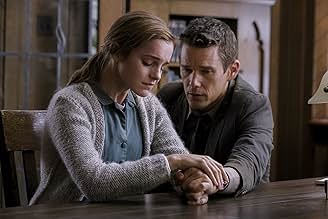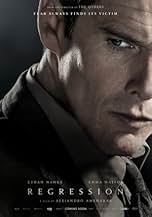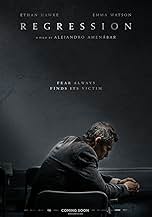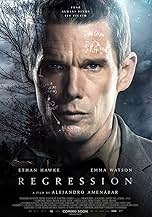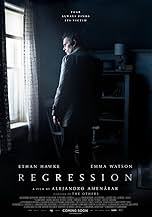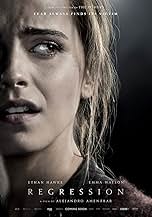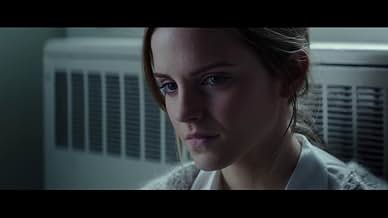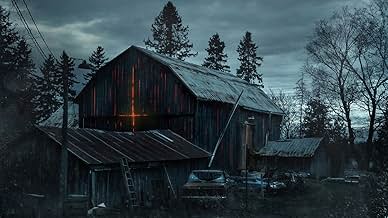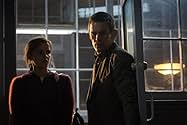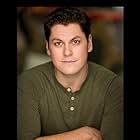A detective and a psychoanalyst uncover evidence of a satanic cult while investigating a young woman's terrifying past.A detective and a psychoanalyst uncover evidence of a satanic cult while investigating a young woman's terrifying past.A detective and a psychoanalyst uncover evidence of a satanic cult while investigating a young woman's terrifying past.
- Awards
- 1 win & 2 nominations total
- Director
- Writer
- All cast & crew
- Production, box office & more at IMDbPro
Featured reviews
And it's also a mystery how we watch movies or what we expect of them. You may watch something and think it's the best thing ever, just to find out you're more or less alone with that sentiment. But that's why arguing or even discussing movies can be so much fun and is intriguing to say the least.
Take this movie, which is not the best thriller ever made, but is more than rock solid. I really liked it and it has to do with the acting, the mood it builds up, the tension throughout and how it makes sense altogether. That doesn't mean that everyone enjoys it or will enjoy watching it. Especially if you can't wrap your head around what is happening - or how it is happening. Some won't like how it turns out (no pun intended), but it was fitting in my book. It's something more for the mind rather than something that just relies on shock values (though it has more than its fair amount of that too)
Take this movie, which is not the best thriller ever made, but is more than rock solid. I really liked it and it has to do with the acting, the mood it builds up, the tension throughout and how it makes sense altogether. That doesn't mean that everyone enjoys it or will enjoy watching it. Especially if you can't wrap your head around what is happening - or how it is happening. Some won't like how it turns out (no pun intended), but it was fitting in my book. It's something more for the mind rather than something that just relies on shock values (though it has more than its fair amount of that too)
I don't think this one will take any prizes for acting, or even for its fairly modest special effects, but it has a reasonably intelligent script and enough tension and intrigue to keep the audience awake. It takes its inspiration from a wave of Satanic child abuse accusations and actual court cases that swept the world in the 1980s and 90s, but fizzled out with very little hard evidence emerging and very few convictions. Many blamed 'false memories' implanted by well-meaning counselors and psychologists and even the Press, unintentionally encouraging people in the creation of fantasies. 'Regression' tries to show how, in a manner reminiscent of the Salem witch trials, human suggestibility creates 'evidence' out of thin air, and delusional states become contagious. In doing this it is of course skating on thin ice, since similar ideas have often been used in attempts to discredit the claims of those reporting genuine 'historical' cases of assault or abuse.
The resolution presented in 'Regression' is perhaps one of the least satisfying aspects of the film, and I was surprised that no reference was made to the fundamentalist Christian element for which parts of America are so famous.
I think this one entertains, and after a slowish start builds up to quite a fast and dramatic pace in the second half. I would definitely recommend seeing it, but I don't think you would lose very much by waiting for it to get to rental or television.
The resolution presented in 'Regression' is perhaps one of the least satisfying aspects of the film, and I was surprised that no reference was made to the fundamentalist Christian element for which parts of America are so famous.
I think this one entertains, and after a slowish start builds up to quite a fast and dramatic pace in the second half. I would definitely recommend seeing it, but I don't think you would lose very much by waiting for it to get to rental or television.
I knew nothing about the film before I watched it, nor about the events on which it is based. Perhaps because of this I became very confused about the film's point of view.
At base, this film asks the viewer to try to distinguish reality from fantasy during a police inquiry into accusations of satanic abuse. The problem with the fim-maker's style, for me, was that all the resources of cinema were used to illustrate not only the satanic abuse reported by witnesses but also other scenarios that had not been reported, so we saw constant scenes of abusers with spookily made-up faces and monks' cowls, and various horrific depictions of satanic abuse. Because cinema is a naturalistic medium, it was difficult to know what was fantasy and what was reality.
The film in some ways had a classic detective-story structure, with Ethan Hawke as the determined investigator. But it became clear that he was an unreliable first-person character after he began behaving irrationally, and that left me, as a viewer, with nothing to cling to as a source of viewpoint in the film. When it came to scenes in which the detective was absent, it was even more difficult to distinguish what the film-maker was depicting as real and what as fantasy. For example, when the victim's grandmother went out to her shed, she saw a normal cat, which turned into a devil cat. This had nothing to do with the investigation, yet its satanic imagery was of the same type as that provoked by the regression-therapy sessions. Perhaps some point was being made about the phenomenon of group hallucination or delusion, but the film repeatedly neglected its responsibility to give us a touchstone by which we could judge the accuracy of what we were seeing.
I think the film could have addressed the topic better with the excellent actors at its disposal by NOT depicting any of the satanic events. It would have been all the more chilling for that, adding to the tension of the inquiry. The most famous dramatisation of this sort of subject matter was Arthur Miller's "The Crucible". Miller creates nightmarish scenes of communal paranoia but without illustrating any of the events described by the witnesses. And this does not hinder the story's potency. (What could be more horrific than to see Miller's village girls in full accusatory mode, triggering the arrest of various pillars of the community on charges of devil worship?) "Regression", however, lacks the necessary moral distance from the events it depicts. Only in the last minute or two is sanity restored. I left the cinema feeling as if I had been cruelly led about by the nose to no satisfactory purpose.
At base, this film asks the viewer to try to distinguish reality from fantasy during a police inquiry into accusations of satanic abuse. The problem with the fim-maker's style, for me, was that all the resources of cinema were used to illustrate not only the satanic abuse reported by witnesses but also other scenarios that had not been reported, so we saw constant scenes of abusers with spookily made-up faces and monks' cowls, and various horrific depictions of satanic abuse. Because cinema is a naturalistic medium, it was difficult to know what was fantasy and what was reality.
The film in some ways had a classic detective-story structure, with Ethan Hawke as the determined investigator. But it became clear that he was an unreliable first-person character after he began behaving irrationally, and that left me, as a viewer, with nothing to cling to as a source of viewpoint in the film. When it came to scenes in which the detective was absent, it was even more difficult to distinguish what the film-maker was depicting as real and what as fantasy. For example, when the victim's grandmother went out to her shed, she saw a normal cat, which turned into a devil cat. This had nothing to do with the investigation, yet its satanic imagery was of the same type as that provoked by the regression-therapy sessions. Perhaps some point was being made about the phenomenon of group hallucination or delusion, but the film repeatedly neglected its responsibility to give us a touchstone by which we could judge the accuracy of what we were seeing.
I think the film could have addressed the topic better with the excellent actors at its disposal by NOT depicting any of the satanic events. It would have been all the more chilling for that, adding to the tension of the inquiry. The most famous dramatisation of this sort of subject matter was Arthur Miller's "The Crucible". Miller creates nightmarish scenes of communal paranoia but without illustrating any of the events described by the witnesses. And this does not hinder the story's potency. (What could be more horrific than to see Miller's village girls in full accusatory mode, triggering the arrest of various pillars of the community on charges of devil worship?) "Regression", however, lacks the necessary moral distance from the events it depicts. Only in the last minute or two is sanity restored. I left the cinema feeling as if I had been cruelly led about by the nose to no satisfactory purpose.
Mystery/thrillers are always the movies that I enjoy the most. I just like that genre, where you relax and try to figure out what's going on. Sometimes they are bad and sometimes they are good like this one. I didn't see the end coming and that's what I like most about it. Even though I would have preferred another ending, it doesn't matter because it came as a surprise to me and that I enjoy. Especially when it's with good actors like Ethan Hawke and Emma Watson. All the other actors were quality as well. I truly enjoyed the dark passages of Regression. Good job from Alejandro Amenábar. I will certainly watch more of his movies. I can get that some people don't like the movie but to give it a rating under five is just ridiculous. That's my point of view. Certainly when you see the amount of garbage movies that get more points then Regression.
This film is not a conventional 7 - a score I would tend to give to a decent but not outstanding film. Regression was in some ways an 8, or dare I say it 9, but some of its flaws are just too bad g to ignore.
I will start by talking about its strong points. The story line and script were engaging, unpredictable and fresh. There were enough twists and turns to keep the viewer guessing, and without too much in fact happening, the film is disturbing and uncomfortable to watch. The twists as the film goes on are not outlandish - a careful viewer will be able to pick up on a number of subtle clues. The acting is good and the characters succeed of convincing us of their roles - mostly.
What then is wrong? First and foremost - whilst the female lead is a good actress, her American accent just isn't convincing enough for us to forget about Hermione. Secondly, whilst I am no expert of the American justice system, some of the practises and actions taken by the police seem questionable and unrealistic. The psychologist is cliché and annoying - going round insulting strangers for having religious beliefs. The ending is an anti climax once the big revelation has occurred, and it seems like the writers tried to re kindle the atmosphere, which doesn't happen. The ending is also a bit hard to square in your mind logically.
Therefore, whilst this film is a very enjoyable watch, its flaws deprive it of the 8+ score in my eyes.
I will start by talking about its strong points. The story line and script were engaging, unpredictable and fresh. There were enough twists and turns to keep the viewer guessing, and without too much in fact happening, the film is disturbing and uncomfortable to watch. The twists as the film goes on are not outlandish - a careful viewer will be able to pick up on a number of subtle clues. The acting is good and the characters succeed of convincing us of their roles - mostly.
What then is wrong? First and foremost - whilst the female lead is a good actress, her American accent just isn't convincing enough for us to forget about Hermione. Secondly, whilst I am no expert of the American justice system, some of the practises and actions taken by the police seem questionable and unrealistic. The psychologist is cliché and annoying - going round insulting strangers for having religious beliefs. The ending is an anti climax once the big revelation has occurred, and it seems like the writers tried to re kindle the atmosphere, which doesn't happen. The ending is also a bit hard to square in your mind logically.
Therefore, whilst this film is a very enjoyable watch, its flaws deprive it of the 8+ score in my eyes.
Storyline
Did you know
- Trivia"Satanic Panic" is the name of the cultural obsession with "Satanic Ritual Abuse" which originated in the United States in the 1980s with the now-discredited memoir-style book "Michelle Remembers," written by Canadians Michelle Smith and her husband, psychiatrist Lawrence Pazder. The authors made waves during the 80's by traveling the talk-show circuit and testifying as expert witnesses in criminal trials alleging Satanic abuse. The book and Smith are represented in the film as "In Satan's Name" by S. Cooper, who is shown as a TV interview subject whose face is obscured in shadow to hide her identity.
- GoofsThe poster of Polish Death/Black Metal Band Behemoth is from 2014 whereas the film is set in 1990.
- Quotes
Bruce Kenner: I am starting to use my head again.
- ConnectionsFeatured in Projector: Macbeth/Regression (2015)
- SoundtracksThat's Where the Blues Begin
Written by Thomm Jutz and Peter Cronin
Music Library & SFX SL / Audio Network Ltd
- How long is Regression?Powered by Alexa
Details
- Release date
- Countries of origin
- Official site
- Language
- Also known as
- Truy Hồi Ký Ức
- Filming locations
- RC Harris Water Treatment Plant, Toronto, Ontario, Canada(prison exteriors)
- Production companies
- See more company credits at IMDbPro
Box office
- Budget
- $20,000,000 (estimated)
- Gross US & Canada
- $55,039
- Opening weekend US & Canada
- $33,915
- Feb 7, 2016
- Gross worldwide
- $17,671,101
- Runtime1 hour 46 minutes
- Color
- Sound mix
- Aspect ratio
- 2.35 : 1
Contribute to this page
Suggest an edit or add missing content




